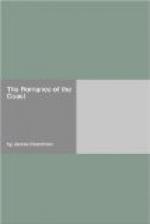“I have several books. I got one on a stall—a very good one about heroes. It has a lot in it about the Norsemen. If you come in you can see my books. You might have some tea. I put the kettle ready before I went out.”
I stepped into the hut, and found it warm and cosy. A cake of barley bread was on the table, and a little black teapot stood there also. There was no furniture but a low wooden bed, one chair, a settle, and a broad shelf. On the shelf was a slate scrabbled all over with geometrical figures, and one of these figures was a parabola with two tangents drawn touching. This puzzled me much. I sat down to warm my hands and my half-frozen face, and when I felt comfortable I said,
“Do you read conic sections, young gentleman?”
His bonnet was off now, and I saw his broad, compact forehead and his massive temples. He looked capable of reading anything.
He replied, quite simply:
“Oh, yes! I read geometrical conics.”
“And did you teach yourself?”
“Yes. It isn’t hard after you’ve got over the sixth book of Euclid.”
I grew more and more puzzled and interested. We had some tea, which made me feel positively luxurious, and then I looked at the backs of the books. There were “The Pilgrim’s Progress,” and “Tappan on the Will.” Then came Shakespeare, a shilling edition of Keats, Drew’s “Conic Sections,” Hall’s “Differential Calculus,” Baker’s “Land Surveying,” Carlyle’s “Heroes,” a fat volume of Shelley, “The Antiquary,” White’s “Selborne,” Bonnycastle’s “Algebra,” and five volumes of “The Tales of the Borders.”
“You have a capital lot of books, my man. I suppose you know them all by heart, pretty well?”
“Yes, I know them; not by heart exactly, but I’ve had a lot of time these two winters, and I’ve gone over them and written about them.”
“Well, which do you like best of all?”
“My fancy’s all for mathematics, but I like poetry.”
“Ah! And I suppose you write poetry—don’t you, now?”
He was not abashed—he said in an ordinary tone, “Very often. It doesn’t seem good, but I go on at it. It pleases me and puts away the time now and then. There’s some in that copy-book at your side.”
I know what a fearful thing youthful poetry is, and I felt a discreet dread. But I opened the book and saw that the young man had been writing verses in a large strong hand. I did not read much. There was one pair of broken quatrains which I remember:—
“Though
toil is heavy I’ll not be sad,
I’ll
rest content while my pulses beat;
If I work, and love,
and trust and be glad,
Perchance
the world will come to my feet.
But if no fortune ever
be mine,
If my bones
on this grey hill-side must lie,
As long as I breathe
I’ll not repine,
I’ve
gladly lived and I’ll gladly die.”
“You’re not very particular about the form of your verses,” said I.




